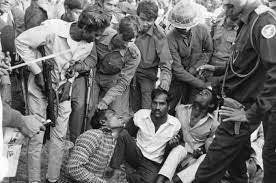 Anees Ali Shah
Anees Ali Shah
Atrocities frequently go unreported in history because they are eclipsed by more notable occurrences. One terrible chapter that has to be acknowledged and remembered is the genocide of non-Bengalis in East Pakistan during the 1971 War. While the suffering of Bengalis is recognized by the international community, non-Bengali minorities’ hardship has mostly gone unnoticed. It’s time to bring attention to this forgotten massacre and give those who have been kept silent for too long a voice.
Bloody fighting during the 1971 War led to East Pakistan’s separation from Pakistan. Non-Bengali communities were targeted for systematic brutality and mass murders during this time, including communities of Biharis, Urdu-speakers, and other racial and religious minorities. These communities, which had ties to West Pakistan historically, were marginalized and used as scapegoats.
The Mukhti Bahni and its allies carried out a planned effort to expel non-Bengalis. Numerous non-Bengali citizens were targeted, and their homes and families were destroyed. There were several cases of rape, torture, and unlawful killings. This was not a random act of violence; rather, it was part of a well-thought-out scheme to wipe out entire towns.
The lack of attention given to the genocide of non-Bengalis in East Pakistan in popular narratives is one of the reasons it is still not recognized. Even though it is important to concentrate on Bengalis’ pain, it has unintentionally resulted in the deletion of other victims’ stories. Because of this, there is still an imperfect knowledge of the dispute, and those who were equally impacted were not treated fairly.
It is not intended to minimize the suffering of the Bengali people by acknowledging the genocide of non-Bengalis, but rather to support the universality of human rights. In cultures currently dealing with the aftereffects of such conflicts, acknowledging past crimes is a step towards promoting healing, reconciliation, and inclusivity. The dominant narrative must be contested in order to give all victims a voice and honor their suffering.
If the genocide of non-Bengalis in East Pakistan is not addressed, it will affect global justice and accountability more broadly. Regardless of political expediency or historical narratives, it emphasizes the need for thorough and objective inquiries into all incidents of genocide and human rights crimes. We can build a more just and compassionate society that respects the rights and dignity of every person by taking lessons from the past.
We must pay attention to and take action in response to the ongoing genocide of people who are not Bengalis in East Pakistan. In addition to being morally required, remembering and honoring these victims is essential for comprehending the intricacies of conflicts and promoting a more inclusive and just society. In order to create a better future for future generations, let’s work to correct the historical record and make sure that the suffering of all groups is acknowledged.
The writer is former member of Human Rights Commission of Pakistan



